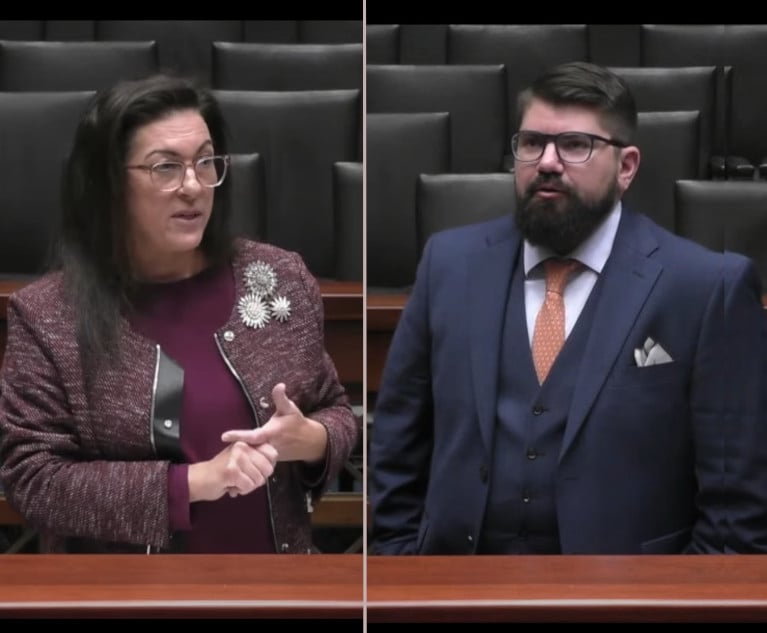 Texas Supreme Court building in Austin, Texas.
Texas Supreme Court building in Austin, Texas.Texas Cancels In-Person July Bar Exam, Offers Online October Test
Texas becomes the third jurisdiction in a week to pull the plug on its July bar exam, amid rising COVID-19 cases.
July 04, 2020 at 02:44 PM
3 minute read
Texas' July bar exam is the latest casualty of COVID-19.
The Supreme Court of Texas on Friday issued an emergency order canceling the exam, which was to be held in person on July 28 and 29. Examinees who were slated to take the test this month may either take the previously scheduled in-person exam on Sept. 9 and 10, or a newly announced online bar exam Oct. 5 and 6, the court said.
"In recent weeks, the state of the COVID-19 pandemic in Texas has changed significantly, and the Court and the Board have received numerous comments from the Texas law school deans, members of the Texas Bar, recent law school graduates, and other members of the public expressing concerns regarding the administration of the July 2020 bar examination and urging other options," the order reads.
Texas is now the third jurisdiction in a week to pull the plug on its in-person July bar exam. The Florida Supreme Court on July 1 canceled the state's in-person July exam and announced a one-day online bar exam given August 18. The following day, the Tennessee Supreme Court canceled its in-person July bar exam and directed candidates to a planned in-person test given Sept. 30 and Oct. 1. Also on July 1, Massachusetts' high court canceled the state's planned September in-person bar exam and instead will offer the two-day online exam being designed by the National Conference of Bar Examiners on Oct. 5 and 6. It joins Washington D.C. and Maryland in the move to the online October test.
Texas' high court voted 6-2 to cancel the July exam, though the majority were split on how to handle alternatives to the exam. The majority rejected calls by recent graduates to adopt an emergency diploma privilege that would allow them to be sworn into to bar with taking and passing the exam—a measure already adopted by Utah, Washington, and Oregon amid the pandemic. The deans of the state's 10 law schools had also requested that the court consider an emergency diploma privilege in a June 29 letter proposing alternatives to the July exam. However, Justices Nathan Hecht and Paul Green dissented from the emergency order, saying that they favor a diploma privilege.
This content has been archived. It is available through our partners, LexisNexis® and Bloomberg Law.
To view this content, please continue to their sites.
Not a Lexis Subscriber?
Subscribe Now
Not a Bloomberg Law Subscriber?
Subscribe Now
NOT FOR REPRINT
© 2024 ALM Global, LLC, All Rights Reserved. Request academic re-use from www.copyright.com. All other uses, submit a request to [email protected]. For more information visit Asset & Logo Licensing.
You Might Like
View All
How Uncertainty in College Athletics Compensation Could Drive Lawsuits in 2025

'It's Like They Lynched You:' Law Professor's Discrimination Claim Reaches High Court
7 minute read
Uvalde Shooting 'Fresh in Everyone's Mind:' Lone Dissenting Judge Disagrees with School's Disciplinary Decision Over Pellet Gun

Newsmakers: University of Houston Law Center Receives $1.25 Million Gift for Mediation Clinic
Trending Stories
- 1'Largest Retail Data Breach in History'? Hot Topic and Affiliated Brands Sued for Alleged Failure to Prevent Data Breach Linked to Snowflake Software
- 2Former President of New York State Bar, and the New York Bar Foundation, Dies As He Entered 70th Year as Attorney
- 3Legal Advocates in Uproar Upon Release of Footage Showing CO's Beat Black Inmate Before His Death
- 4Longtime Baker & Hostetler Partner, Former White House Counsel David Rivkin Dies at 68
- 5Court System Seeks Public Comment on E-Filing for Annual Report
Who Got The Work
Michael G. Bongiorno, Andrew Scott Dulberg and Elizabeth E. Driscoll from Wilmer Cutler Pickering Hale and Dorr have stepped in to represent Symbotic Inc., an A.I.-enabled technology platform that focuses on increasing supply chain efficiency, and other defendants in a pending shareholder derivative lawsuit. The case, filed Oct. 2 in Massachusetts District Court by the Brown Law Firm on behalf of Stephen Austen, accuses certain officers and directors of misleading investors in regard to Symbotic's potential for margin growth by failing to disclose that the company was not equipped to timely deploy its systems or manage expenses through project delays. The case, assigned to U.S. District Judge Nathaniel M. Gorton, is 1:24-cv-12522, Austen v. Cohen et al.
Who Got The Work
Edmund Polubinski and Marie Killmond of Davis Polk & Wardwell have entered appearances for data platform software development company MongoDB and other defendants in a pending shareholder derivative lawsuit. The action, filed Oct. 7 in New York Southern District Court by the Brown Law Firm, accuses the company's directors and/or officers of falsely expressing confidence in the company’s restructuring of its sales incentive plan and downplaying the severity of decreases in its upfront commitments. The case is 1:24-cv-07594, Roy v. Ittycheria et al.
Who Got The Work
Amy O. Bruchs and Kurt F. Ellison of Michael Best & Friedrich have entered appearances for Epic Systems Corp. in a pending employment discrimination lawsuit. The suit was filed Sept. 7 in Wisconsin Western District Court by Levine Eisberner LLC and Siri & Glimstad on behalf of a project manager who claims that he was wrongfully terminated after applying for a religious exemption to the defendant's COVID-19 vaccine mandate. The case, assigned to U.S. Magistrate Judge Anita Marie Boor, is 3:24-cv-00630, Secker, Nathan v. Epic Systems Corporation.
Who Got The Work
David X. Sullivan, Thomas J. Finn and Gregory A. Hall from McCarter & English have entered appearances for Sunrun Installation Services in a pending civil rights lawsuit. The complaint was filed Sept. 4 in Connecticut District Court by attorney Robert M. Berke on behalf of former employee George Edward Steins, who was arrested and charged with employing an unregistered home improvement salesperson. The complaint alleges that had Sunrun informed the Connecticut Department of Consumer Protection that the plaintiff's employment had ended in 2017 and that he no longer held Sunrun's home improvement contractor license, he would not have been hit with charges, which were dismissed in May 2024. The case, assigned to U.S. District Judge Jeffrey A. Meyer, is 3:24-cv-01423, Steins v. Sunrun, Inc. et al.
Who Got The Work
Greenberg Traurig shareholder Joshua L. Raskin has entered an appearance for boohoo.com UK Ltd. in a pending patent infringement lawsuit. The suit, filed Sept. 3 in Texas Eastern District Court by Rozier Hardt McDonough on behalf of Alto Dynamics, asserts five patents related to an online shopping platform. The case, assigned to U.S. District Judge Rodney Gilstrap, is 2:24-cv-00719, Alto Dynamics, LLC v. boohoo.com UK Limited.
Featured Firms
Law Offices of Gary Martin Hays & Associates, P.C.
(470) 294-1674
Law Offices of Mark E. Salomone
(857) 444-6468
Smith & Hassler
(713) 739-1250






